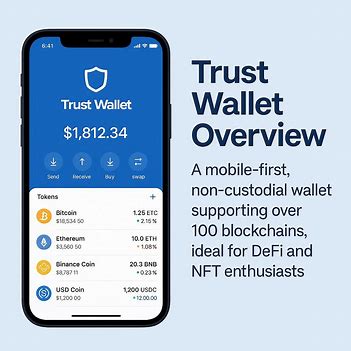Top 5 Crypto Wallets for Beginners: Security and Features Compared
Top 5 Crypto Wallets for Beginners: Security and Features Compared
Dipping your toes into cryptocurrency? Choosing the right crypto wallet is your first step to securely storing Bitcoin, Ethereum, or other digital assets. In 2025, crypto trading for beginners is more accessible than ever, thanks to user-friendly wallets designed with security and simplicity in mind. This guide compares the top 5 crypto wallets for beginners, focusing on security, features, and ease of use. Whether you’re buying your first BTC or exploring DeFi, we’ve got you covered with actionable insights and a comparison table. Let’s find the best crypto wallet for you!
Why Crypto Wallets Matter for Beginners
A crypto wallet is a software or hardware tool that stores your private keys, allowing you to send, receive, and manage cryptocurrencies. Unlike traditional wallets, they don’t hold physical coins but secure access to your funds on the blockchain. For beginners, the right wallet balances ease of use with robust security, especially given recent hacks like Bybit’s $1.5 billion loss in February 2025 CryptoNews, 2025. Key benefits include:
- Security: Protects your assets from hacks and scams.
- Accessibility: Simplifies buying, storing, and trading crypto.
- Control: Non-custodial wallets give you full ownership of your keys.
Top 5 Crypto Wallets for Beginners in 2025
Based on security, usability, and features, here are the top crypto wallets for beginners, with pros, cons, and tips.
1. Zengo

Overview: Zengo is a mobile-first, non-custodial wallet using Multi-Party Computation (MPC) to eliminate seed phrases, making it a top pick for beginners Zengo.
Features:
- Keyless security with MPC and 3-factor authentication (email, 3D Facelock, cloud backup).
- Supports 120+ cryptocurrencies, including BTC, ETH, and SOL.
- 24/7 live support and in-app fiat-to-crypto purchases.
Pros:
- No seed phrase, reducing risk of loss or theft.
- User-friendly interface, rated 4.8/5 on Google Play.
- Free tier; Pro plan ($19.99/month) adds Web3 firewall.
Cons:
- Limited desktop support.
- Some advanced features (e.g., theft protection) require Pro plan.
Best For: Beginners prioritizing security and simplicity. See our crypto security tips for more.
Tip: Use Zengo’s fiat on-ramp to buy crypto with Apple Pay or credit card for quick setup.
2. Coinbase Wallet

Overview: A non-custodial wallet from Coinbase, designed for beginners with seamless integration to its exchange Coinbase Wallet.
Features:
- Supports 100+ cryptocurrencies and 10+ blockchains (e.g., ETH, SOL).
- Biometric authentication and encrypted storage.
- In-app fiat-to-crypto conversion and tax reporting.
Pros:
- Free to download, with low network fees.
- Beginner-friendly interface, rated 4.7/5 on Apple Store.
- Integrates with Coinbase for instant purchases.
Cons:
- Not fully open-source, limiting code transparency.
- Fewer blockchains than competitors like Trust Wallet.
Best For: Newcomers wanting a trusted, exchange-linked wallet. Check our crypto trading guide.
Tip: Enable 2FA and store your recovery phrase offline to secure your wallet.
3. Trust Wallet

Overview: A mobile-first, non-custodial wallet supporting over 100 blockchains, ideal for DeFi and NFT enthusiasts.
Features:
- Supports 100,000+ assets, including BTC, ETH, and BNB.
- Built-in DApp browser for DeFi and NFTs.
- Staking for passive income (up to 8% APY).
Pros:
- Free with no subscription fees.
- Broad blockchain support, rated 4.5/5 on Google Play.
- Beginner-friendly with in-app tutorials.
Cons:
- Limited customer support options.
- Mobile app occasionally reports bugs.
Best For: Beginners exploring DeFi or NFTs. Learn more in our DeFi and NFT guide.
Tip: Use Trust Wallet’s DApp browser to explore decentralized exchanges like PancakeSwap.
4. Trezor Model One
Overview: A budget-friendly hardware wallet for secure, offline storage, perfect for beginners with larger holdings Trezor.
Features:
- Supports 1,000+ cryptocurrencies (BTC, ETH, ADA).
- PIN and passphrase protection; open-source firmware.
- USB connection to desktop or mobile apps.
Pros:
- Affordable at $49, lowest among hardware wallets.
- High security with offline key storage.
- Easy setup for beginners.
Cons:
- Lacks Bluetooth or wireless connectivity.
- Limited support for some altcoins (e.g., SOL).
Best For: Beginners prioritizing security over convenience. See our best hardware wallets guide.
Tip: Pair Trezor with Exodus for a user-friendly software interface.
5. Phantom Wallet
 Overview: A hot wallet focused on Solana, with growing support for Ethereum and Polygon, known for its sleek design Phantom.
Overview: A hot wallet focused on Solana, with growing support for Ethereum and Polygon, known for its sleek design Phantom.
Features:
- Supports SOL, ETH, and Polygon tokens.
- Browser extension and mobile app (iOS, Android).
- NFT storage and DeFi integration.
Pros:
- Free and easy to set up, rated 4.4/5 in 2024.
- Seamless Solana DApp integration.
- Beginner-friendly with clear navigation.
Cons:
- Limited Ethereum/Polygon features compared to Solana.
- Occasional bugs in mobile app.
Best For: Beginners trading Solana-based assets or NFTs.
Tip: Use Phantom’s token pages to track market trends and share with friends.
Comparison Table: Top 5 Crypto Wallets for Beginners
| Wallet | Type | Supported Assets | Security Features | Cost | Best For |
|---|---|---|---|---|---|
| Zengo | Hot | 120+ coins | MPC, 3FA, biometric | Free; Pro $19.99/mo | Security-focused beginners |
| Coinbase Wallet | Hot | 100+ coins | 2FA, biometric | Free | Exchange-linked ease |
| Trust Wallet | Hot | 100,000+ assets | 2FA, encryption | Free | DeFi/NFT enthusiasts |
| Trezor Model One | Cold | 1,000+ coins | PIN, open-source | $49 | Secure long-term storage |
| Phantom Wallet | Hot | SOL, ETH, Polygon | Encryption, 2FA | Free | Solana-based trading |
How to Choose the Right Crypto Wallet
- Security Needs: Prioritize non-custodial wallets (all listed) for key control. Use Trezor for large holdings; Zengo for keyless security.
- Ease of Use: Coinbase and Zengo offer intuitive interfaces; Phantom is great for Solana beginners.
- Budget: Free hot wallets (Zengo, Coinbase, Trust, Phantom) suit most; Trezor is affordable for hardware.
- Features: Choose Trust or Phantom for DeFi/NFTs, Coinbase for exchange integration.
Tips for Secure Crypto Storage
- Enable 2FA: Add two-factor authentication on all wallets.
- Backup Safely: Store recovery phrases offline; use Zengo’s cloud backup for ease.
- Verify Apps: Download wallets from official sites to avoid scams Investopedia, 2025.
- Stay Updated: Follow X discussions with #CryptoWallets or #CryptoForBeginners for trends.
Real-World Applications
- DIY Crypto Projects: Use Trust Wallet to interact with DeFi protocols for your blockchain DIY projects.
- Gadgets and Tech: Pair Trezor with a Raspberry Pi for a secure crypto node.
- Trading: Use Coinbase Wallet for quick trades linked to the exchange.
Conclusion
The top 5 crypto wallets for beginners in 2025—Zengo, Coinbase Wallet, Trust Wallet, Trezor Model One, and Phantom—offer a mix of security, simplicity, and features. Start with Zengo for keyless security or Coinbase for exchange integration, and explore Trust or Phantom for DeFi. For long-term storage, Trezor is a budget-friendly hardware option. Download your wallet from official sources, enable 2FA, and start your crypto journey confidently!
Which wallet are you trying first? Share your thoughts in the comments or on X with #CryptoWallets and #CryptoForBeginners. Let’s secure your crypto together!
FAQ
- What’s the safest crypto wallet for beginners? Zengo’s keyless MPC security is ideal for ease and safety.
- Can I use multiple wallets? Yes, combine hot (e.g., Coinbase) and cold (e.g., Trezor) wallets for flexibility.
- Are free wallets secure? Yes, if non-custodial and from official sources, but always enable 2FA.





